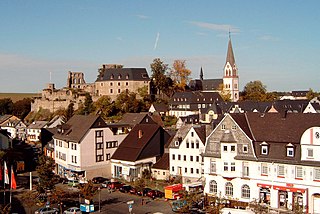
Kastellaun is a town in the Rhein-Hunsrück-Kreis (district) in Rhineland-Palatinate, Germany. It is the seat of the like-named Verbandsgemeinde, a kind of collective municipality.

Gutenberg is an Ortsgemeinde – a municipality belonging to a Verbandsgemeinde, a kind of collective municipality – in the Bad Kreuznach district in Rhineland-Palatinate, Germany. It belongs to the Verbandsgemeinde of Rüdesheim, whose seat is in the municipality of Rüdesheim an der Nahe. Gutenberg is a winegrowing village.
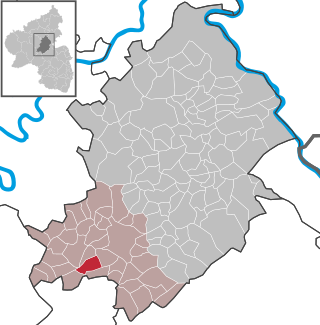
Dill is an Ortsgemeinde – a municipality belonging to a Verbandsgemeinde, a kind of collective municipality – in the Rhein-Hunsrück-Kreis (district) in Rhineland-Palatinate, Germany. It belongs to the Verbandsgemeinde of Kirchberg, whose seat is in the like-named town, and it is home to a castle ruin that bears the same name.
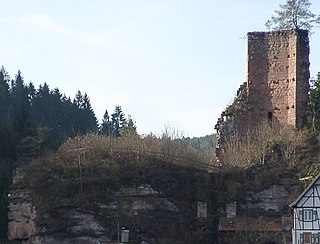
Elmstein Castle is a castle ruin built in the High Middle Ages overlooking Elmstein in the Palatinate Forest in the German state of Rhineland-Palatinate. It was built in the 12th century.

Altdahn Castle is a castle ruin in the Palatinate Forest, the German part of the Wasgau region. It is located near the town of Dahn in Rhineland-Palatinate, Germany. It stands 337 metres (1,106 ft) above sea level (NN).

The County of Sponheim was an independent territory in the Holy Roman Empire that lasted from the 11th century until the early 19th century. The name comes from the municipality of Sponheim, where the counts had their original residence.

Finkenstein Castle is a ruined medieval castle in the market town of Finkenstein, in the Austrian state of Carinthia. It is situated on a steep cliff at the southern foot of the Karawanks mountain range, high above Lake Faak, at a height of 788 metres (2,585 ft). Today the castle ruin is the backdrop of the Burgarena, an amphitheatre with 1150 seats mainly used for concerts and festivals.

Sponheim Castle is a medieval ruin in Burgsponheim on the edge of the Hunsrück mountain range in Rhineland-Palatinate, Germany. From the 12th century it was the original residence of the Counts of Sponheim. Significant portions of the castle remain standing.
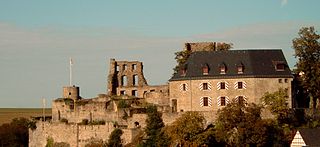
Kastellaun Castle is a ruined medieval castle in Kastellaun in the Rhein-Hunsrück district in Rhineland-Palatinate, Germany.

The Sporkenburg is a late medieval castle ruin about one kilometre south of Eitelborn in the district of Westerwaldkreis in the German state of Rhineland-Palatinate.

Grafendahn Castle lies in the southern Palatine Forest, the German part of the Wasgau region, just under 1 kilometre east of the small town of Dahn in the state of Rhineland-Palatinate.

Tanstein Castle is the ruin of a rock castle in the southern Palatine Forest, the German part of the Wasgau region. It lies just under a kilometre east of the small town of Dahn in the state of Rhineland-Palatinate.

Erfenstein Castle is a medieval spur castle in the German state of Rhineland-Palatinate. It lies within the Palatine Forest above the Elmstein Valley at 265 m above sea level (NN) in the vicinity of the hamlet of Erfenstein in the municipality of Esthal. Together with nearby Spangenberg Castle, it is linked to the legend of the Leather Bridge.
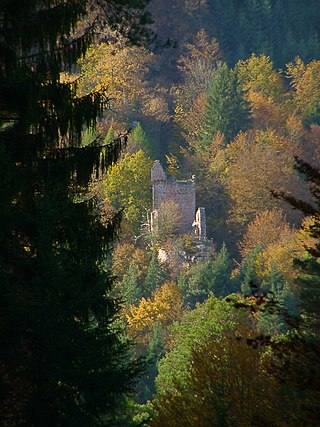
The ruins of Breitenstein Castle stand on a crag, 220 metres (720 ft) high, on the northern side of the Speyerbach valley in the Palatine Forest in Germany. The castles is 4 kilometres (2.5 mi) east of the village of Elmstein in the county of Bad Dürkheim in the state of Rhineland-Palatinate.

Guttenberg Castle is a ruined rock castle near the French border in the German part of the Wasgau, which in turn is part of the Palatine Forest in the state of Rhineland-Palatinate.

Falkenstein Castle, also called New Falkenstein (Neu-Falkenstein), is a ruined hill castle at 450 m above sea level (NHN) in the eponymous climatic spa of Falkenstein, a quarter of Königstein im Taunus in the county of Hochtaunuskreis in the German state of Hesse.

Falkenstein Castle is a ruined hill castle near Freiburg im Breisgau on the territory of the present-day municipality Breitnau in the county of Breisgau-Hochschwarzwald in the German state of Baden-Württemberg. The castle site lies in a triangle formed by the entrance of the Höllental valley – the Lower Höllental and the Engenbach valley, not far from the Buchenbach village of Falkensteig, 617.6 m above sea level (NN) on a rocky crag that is very difficult to get to today. Of the castle itself only a few wall remains are left. It is one of the less well preserved ruins in the Breisgau.

Old Wolfstein Castle, is a ruined hillside castle on the eastern slopes of the Königsberg at the narrowest point in the Lauter valley near Wolfstein in the county of Kusel in the German state of Rhineland-Palatinate.
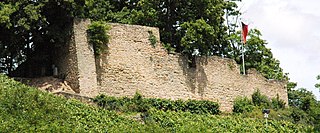
New Wolfstein Castle is a ruined hill castle on a 238-metre-high hill above the town of Wolfstein in the county of Kusel in the German state of Rhineland-Palatinate. Today the ruins are a cultural monument

Landsberg Castle is a ruined hillside castle on the hill of Moschellandsberg near the town of Obermoschel in the German state of Rhineland-Palatinate. It may be hired out for private events.
This page is based on this
Wikipedia article Text is available under the
CC BY-SA 4.0 license; additional terms may apply.
Images, videos and audio are available under their respective licenses.




















